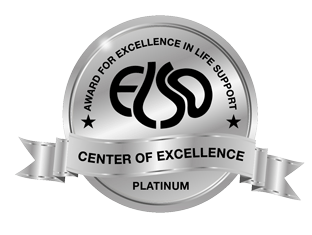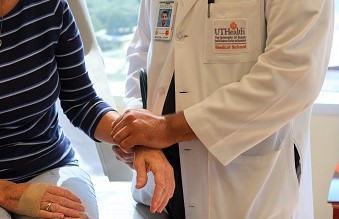
Cardiogenic Shock and Percutaneous Mechanical Circulatory Support Program
The UTHealth Houston Cardiogenic Shock Team is available 24 hours a day, seven days a week, to assist with the immediate evaluation and management of cardiogenic shock patients. To speak with an on-call Cardiogenic Shock team member call (713) 704-4300.
Cardiogenic shock is a condition where the heart struggles to pump an adequate supply of blood to meet the body’s demands. While it often arises shortly after a severe heart attack, it can also be a result of cardiac surgery or an acute illness such as cardiomyopathy, characterized by a weakening of the heart muscle. In certain cases, patients with chronic heart failure may deteriorate into cardiogenic shock.
The timely treatment of patients with cardiogenic shock is essential to reestablish perfusion, which is the vital process of delivering blood to the body’s organs. This approach is crucial for preventing further decline and allowing the heart to recover. At UTHealth Houston, we deploy mechanical circulatory support devices as needed, either to provide temporary assistance to the heart during the recovery process or as a bridge towards long-term therapies, which may encompass heart transplantation. Evidence shows that prompt intervention with mechanical support, when appropriately indicated for cardiogenic shock patients, significantly enhances patient outcomes.
 Our Cardiogenic Shock and Percutaneous Mechanical Circulatory Support Pprogram is at your service around the clock, seven days a week, providing immediate evaluation and management for cardiogenic shock patients.
Our Cardiogenic Shock and Percutaneous Mechanical Circulatory Support Pprogram is at your service around the clock, seven days a week, providing immediate evaluation and management for cardiogenic shock patients.
UTHealth Houston has been distinguished as an ECMO Platinum Level Center of Excellence, a testament to our extensive experience and successful outcomes in various conditions that lead to cardiogenic shock.
 At UTHealth Houston, the cardiogenic shock team is a collaborative effort uniting the skills of cardiologists and cardiac surgeons, dedicated to promptly addressing patients in severe cardiogenic shock. With a single phone call, our team of renowned surgical, interventional, and medical specialists assembles, efficiently collecting patient information to prescribe the most effective therapy.
At UTHealth Houston, the cardiogenic shock team is a collaborative effort uniting the skills of cardiologists and cardiac surgeons, dedicated to promptly addressing patients in severe cardiogenic shock. With a single phone call, our team of renowned surgical, interventional, and medical specialists assembles, efficiently collecting patient information to prescribe the most effective therapy.
The cardiogenic shock team at UTHealth Houston is the ideal point of contact for patients who exhibit:
For common questions or concerns, visit our FAQ page.
When you entrust your patient to our care, you grant them access to a team of highly specialized cardiogenic shock experts. Our dedicated team efficiently evaluates and prioritizes patients, ensuring prompt and focused care.
We believe in personalized medicine, and each patient receives a uniquely tailored treatment plan designed to address their specific needs. Our specialists can comprehensively assess your patient for potential heart transplant or left ventricular assist device candidacy.
The transition from our Cardiogenic Shock program to the UTHealth Houston Heart Failure Discharge Clinic and Advanced Therapies Referral Clinic is seamless, ensuring uninterrupted support for your patient. Subsequently, they receive continuous care at the Memorial Hermann Outpatient Cardiology Clinic.